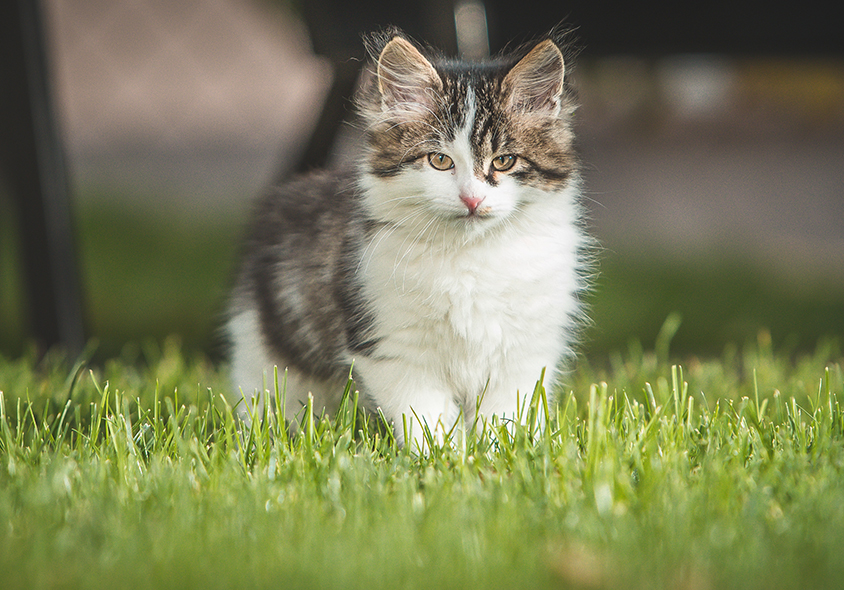Bringing home a new kitten is a joy filled with tiny purrs, playful antics, and plenty of snuggles. Along with all the excitement comes the responsibility of keeping your kitten healthy and thriving. Here’s a medical-focused guide to ensure your kitten gets the best possible start in life.
First Vet Visit: Setting the Foundation
Your kitten’s first vet visit is a key step in their lifelong health journey. During this initial appointment, your vet will:
- Perform a thorough physical exam, checking for any signs of illness or congenital conditions.
- Test for common infectious diseases like feline leukemia virus (FeLV) and feline immunodeficiency virus (FIV).
- Discuss a vaccination schedule and other preventative care measures.
Vaccination Schedule
Vaccinations are essential to protect your kitten from preventable diseases. Most kittens begin their vaccine series around 6 to 8 weeks of age, with boosters every few weeks until they’re about 16 weeks old. Some core vaccines include:
- Feline distemper (panleukopenia): A highly contagious virus that affects kittens, causing vomiting, diarrhea, and lethargy.
- Feline viral rhinotracheitis: A respiratory infection caused by the feline herpes virus, leading to sneezing, coughing, and nasal discharge.
- Rabies: Protects your cat from the fatal rabies virus and is a legal requirement in most areas.
Parasite Prevention
Kittens are particularly vulnerable to parasites. At your kitten’s first check-up, your vet will likely test for intestinal parasites like roundworms, hookworms, and giardia, and may recommend deworming treatments. These parasites can be passed from a mother cat or picked up in the environment, so early detection is key.
External parasites, like fleas and ear mites, are also common. Even indoor cats can end up with fleas, so flea prevention is important. Your vet can recommend safe flea treatments for your kitten’s age and weight.
Spaying and Neutering
Spaying or neutering your kitten is a responsible decision that can help prevent unwanted litters and improve their health. Cats can be spayed or neutered as early as 4 to 6 months old. In females, spaying reduces the risk of uterine infections and breast tumors, while neutering males can prevent testicular cancer and reduce undesirable behaviors like spraying.
Nutrition and Feeding
Proper nutrition is critical for a kitten’s growth and development. Kittens need a diet specifically formulated to meet their higher energy and nutrient requirements. Be sure to choose a high-quality kitten food that meets AAFCO standards.
Here are some feeding tips:
- Frequency: Feed your kitten 3 to 4 times a day until they are about 6 months old. After that, you can transition to twice-daily meals.
- Avoid human food: Foods like onions, garlic, chocolate, and grapes are toxic to cats. Stick to their balanced diet to avoid upset stomachs or potential health issues.
Litter Box Training and Hygiene
One of the perks of owning a cat is that they usually take to litter box training quickly. Make sure to provide:
- A clean litter box in a quiet, private area.
- An appropriately-sized box for their age—smaller kittens may benefit from lower-sided boxes until they grow.
Dental Care
Dental care might not be the first thing on your mind with a kitten, but starting good habits early is key. You can introduce toothbrushing slowly, using cat-friendly toothpaste and a soft toothbrush. Regular dental care can prevent tartar buildup and more serious health issues down the road.
Grooming and Skin Care
While most cats are excellent self-groomers, long-haired kittens may benefit from regular brushing to prevent mats and tangles. Grooming also gives you a chance to check for skin issues like dandruff, excessive shedding, or parasites like fleas.
Recognizing Early Signs of Illness
Kittens are more vulnerable to illness in their early months, so it’s important to keep an eye on their behavior. If you notice any of the following, consult your vet:
- Lethargy: Kittens are energetic, so a sudden decrease in activity can be a red flag.
- Sneezing or nasal discharge: Respiratory issues are common in kittens, especially if they’ve come from shelters.
- Loss of appetite: Kittens should be eating regularly. A sudden loss of interest in food is a concern.
Final Thoughts
Your kitten’s first year is full of important milestones, and making sure they get the proper medical care is crucial for setting them up for a long, healthy life. By keeping up with vet visits, vaccinations, parasite prevention, and nutrition, you’ll help your kitten grow into a happy, healthy adult cat.







Leave A Comment